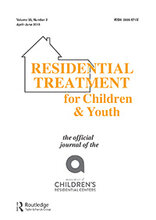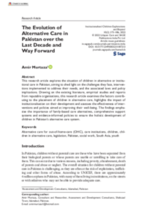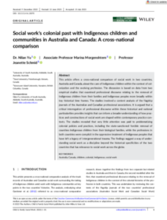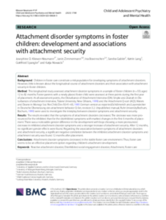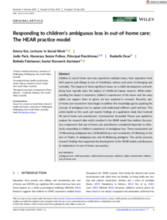Demographic Data
|
Sources: World Bank, UNICEF,UNDP HDR 2015, DHS 2014 |
Displaying 671 - 680 of 14347
In this article, the focus is on youth with minority backgrounds living in majority foster homes and their views on cultural continuity. What is important for these young people when developing their identity in foster homes? The study is based on qualitative interviews with nine adolescents from minority
backgrounds who live in majority foster homes, which are homes in which one or both foster parents have ethnic Norwegian backgrounds. The analysis was conducted using a hermeneutic phenomenology methodology and shows that youth do not necessarily want cultural continuity in the sense of living in a culturally “matched” foster home.
The purpose of the article is to describe and problematise the practice initiated idea of developing a digital tool for children in child welfare investigations and whether and how this welfare technology is useful for social workers. The results include interview data and descriptions of the research process.
This qualitative study explores the prevalence and role of natural mentors in the lives of unaccompanied immigrant youth residing in the Barcelona Metropolitan Area. The authors' findings suggest that natural mentors provide various types of social support and social capital, which fulfil the emotional or educational needs of young people.
This research article explores the situation of children in alternative or institutional care in Pakistan, aiming to shed light on the challenges they face, interventions implemented to address their needs, and the associated laws and policy implications.
This paper intends to capture the landscape of alternative care and its evolution in India, drawing from the review of the legal and policy framework, existing literature, and detailed discussions with Civil Society Organisations(CSOs) and State functionaries.
In this article, the authors discuss residential staff in Sweden where residential care is part of the municipal child welfare system, which covers services targeting juvenile delinquency as well as other residential care services. Children and young people placed in Swedish residential care have diverse needs, from mainly supportive needs to advanced behavioral problems, and the field consists of open and secure residential care units.
This article will present the evolution of alternative care provision in the Maldives.
This article offers a cross-national comparison of social work in two countries, Australia and Canada, about the care of Indigenous children within the context of colonization and the evolving profession.
This longitudinal study aims at investigating the attachment disorder symptoms during the first year of placement in foster care. The participants
were recruited through German social services departments around Dortmund, the Ruhr valley, and the Metropolitan region of Nuremberg.
Drawing on the findings of a qualitative study undertaken in the state of New South Wales (NSW), Australia, this article applies the concept of ambiguous loss to outline the ways in which Out of Home Care practitioners can more adequately respond to children's experience of grief and loss.



